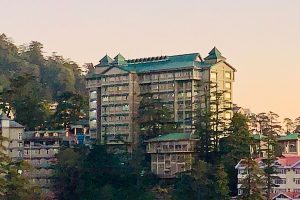Himachal Pradesh High Court: The instant writ is before the bench of Tarlok Singh Chauhan, J. filed by the appellant who was aggrieved by the reversed judgment of the trial court passed by First Appellate Court.
The factual matrix of the case was that the appellant filed a suit for declaration on the allegation that the disputed land was ancestral joint Hindu coparcenary property of the parties and the deceased had no right to execute Will in favor of the respondents who were the sons of the deceased. The cases of the respondents were that they initially objected the suit on maintainability, want of cause of action and non-joinder of necessary parties. The respondents denied the disputed land to be the joint Hindu coparcenary property of the parties and alleged that it was separate property in the hands of the deceased father, Bale Ram. According to the respondents, the suit was bad for non-joinder of necessary parties because besides three sons, deceased had a widow and six daughters, and it was argued that being a necessary party they had to be joined for proper adjudication of the suit. After recording evidence and evaluating the same, the learned trial Court decreed the suit for declaration as per the appellant, however, the relief of permanent prohibitory injunction was refused on the ground that the parties were co-sharers.
Hence, aggrieved by the judgment of trial Court the respondent filed an appeal in the First Appeal Court, the Court then allowed the appeal and the objections of the present appellant were rejected.
The Court highlighted that the issue to be discussed was whether the Lower Appellate Court had committed an error of law and had acted with material illegality in rejecting the application filed by the present appellant for leading additional evidences under Order 41 Rule 27 of CPC? And whether the property was an ancestral property, were such findings illegal and perverse?
The Court held that it was categorically conceded before the Lower Appellate Court that the property in hands of deceased was ancestral hence the Will was non-executable. The present appellant wanted to submit the additional pieces of evidence to prove that the disputed land was ancestral property and now the position was proved, the issues were decided in favor of present appellant. The contention of respondent in the trial as to suit was liable to be dismissed as the necessary party was not joined, was also rejected as the Court stated that such issue was already adjudicated, the Court held that, “the finding recorded by the learned trial Court for coming to the conclusion that the suit is not bad for non-joinder of necessary parties is totally perverse as it was unmindful of the fact that it was dealing with a case of co-sharers, who belonged to one family and were all offspring of deceased.”
The Court further held that it had to be mindful regarding the developments of law which took place during the pendency of the suit i.e., amendment of Section 6 of Hindu Succession Act, where the daughters were held to be coparceners. Hence, the Court also upheld the view of the First Appellate Court while rejecting the contrary to the trial Court. It was held by the First Appellate Court that, “if the suit land is the separate property of Bale Ram, the whole of it will devolve not only on the plaintiffs and defendants but the other heirs of Bale Ram i.e. his widow and daughters. When this fact was especially disclosed by the defendants the plaintiffs were bound to implead them as a party.”
Thus, the Judgment of the First Appellate Court was upheld where the judgment of the trial Court in favor of the appellant was reversed. It was finally held that, the property was a coparcenary property hence the Will was not maintainable but the suit related to declaration had to be dealt according to amended Section 6. [Anil Kumar v. Sher Singh, 2019 SCC OnLine HP 1009, decided on 12-07-2019]

